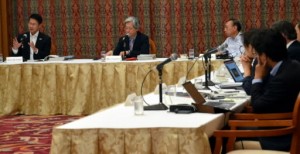Hiroshima Round Table brings together experts from four nations to discuss nuclear disarmament
Aug. 28, 2016
by Hiroshi Ebisu and Jumpei Fujimura, Staff Writers
The Hiroshima Round Table, a meeting to explore a path toward nuclear disarmament in East Asia, opened at a hotel in Hiroshima on August 27. Researchers and former foreign ministers from four nations in the Asia-Pacific region, including nuclear weapon states, have gathered for this meeting, which is sponsored by the Hiroshima prefectural government. The meeting will close on August 29.
The 17 participants include former Japanese foreign minister Yoriko Kawaguchi, university professors from the United States and China, both nuclear weapons states, and a former high official of the South Korean government. In his speech, Hiroshima Governor Hidehiko Yuzaki, one of the participants, referred to the present impasse involving nuclear disarmament and stated, “Nuclear deterrence is taken for granted, but is it really necessary? We need to engage in discussion without taboos.”
On the first day, five people made presentations on the current state of nuclear disarmament in the world, the present situation involving North Korea, and China’s nuclear capabilities. The participants exchanged their views behind closed doors on the themes of the role of nuclear weapons and the process toward nuclear abolition in East Asia.
This meeting is part of the prefectural government’s “Hiroshima for Global Peace” plan. The first such meeting was held in fiscal 2013, and this marks the fourth meeting. Closed-door meetings in smaller groups will be held on August 28. After all sessions conclude on August 29, Mr. Yuzaki and others will report on the results at a news conference.
On the sidelines of the meeting, the prefectural government will hold a public symposium at the International Conference Center Hiroshima starting at 3:15 p.m. on August 29. Five participants of the meeting will be invited to the symposium, where they will hold a panel discussion on a framework for security that does not depend on nuclear weapons.
(Originally published on August 28, 2016)
The Hiroshima Round Table, a meeting to explore a path toward nuclear disarmament in East Asia, opened at a hotel in Hiroshima on August 27. Researchers and former foreign ministers from four nations in the Asia-Pacific region, including nuclear weapon states, have gathered for this meeting, which is sponsored by the Hiroshima prefectural government. The meeting will close on August 29.
The 17 participants include former Japanese foreign minister Yoriko Kawaguchi, university professors from the United States and China, both nuclear weapons states, and a former high official of the South Korean government. In his speech, Hiroshima Governor Hidehiko Yuzaki, one of the participants, referred to the present impasse involving nuclear disarmament and stated, “Nuclear deterrence is taken for granted, but is it really necessary? We need to engage in discussion without taboos.”
On the first day, five people made presentations on the current state of nuclear disarmament in the world, the present situation involving North Korea, and China’s nuclear capabilities. The participants exchanged their views behind closed doors on the themes of the role of nuclear weapons and the process toward nuclear abolition in East Asia.
This meeting is part of the prefectural government’s “Hiroshima for Global Peace” plan. The first such meeting was held in fiscal 2013, and this marks the fourth meeting. Closed-door meetings in smaller groups will be held on August 28. After all sessions conclude on August 29, Mr. Yuzaki and others will report on the results at a news conference.
On the sidelines of the meeting, the prefectural government will hold a public symposium at the International Conference Center Hiroshima starting at 3:15 p.m. on August 29. Five participants of the meeting will be invited to the symposium, where they will hold a panel discussion on a framework for security that does not depend on nuclear weapons.
(Originally published on August 28, 2016)








